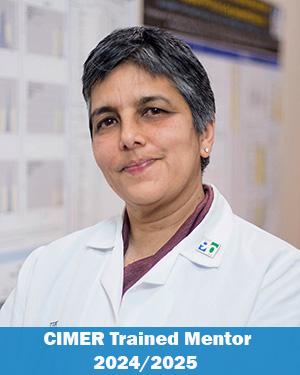Research News
12/30/2024
Cole Eye researchers discover sexual dimorphism in retinas and RPE
Researchers studied sex-based eye differences in preclinical work to guide more personalized treatments.

Researchers at Cleveland Clinic’s Cole Eye Institute have published a first-of-its-kind database of sex-based differences in the retina and retinal pigment epithelium (RPE).
The preclinical study, published in Biology of Sex Differences, illustrates why it is critical to consider sex in research around eye disease, says lead author Bela Anand-Apte, MBBS, PhD, department chair of Cole Eye Institute. Research on sex as a risk factor for age-related macular degeneration (AMD) has been controversial with a few studies showing higher prevalence in older women.
Preclinical studies consistently demonstrate that males are at higher risk of developing diabetes-related retinopathy when compared with females. The exact mechanisms behind these sex differences are currently unclear.
“It is commonly believed that if you manage your diabetes, you avoid this condition, but many people who have good control of their diabetes still get damage to their retina and RPE,” Dr. Anand-Apte says. “The fact that females seem to be more resistant to diabetic retinopathy was intriguing and inspired me to start at square one, before the disease even begins.”
Dr. Anand-Apte teamed up with Belinda Willard, PhD, director of the Proteomics & Metabolomics Core, housed at Lerner Research Institute, to see if there were differences between sexes within the proteome, the entire set of proteins produced in the retina and RPE. Most researchers will use qualitative proteomics to look for proteins that are either present or absent in one group. That data provides a “yes or no” answer to the hypothesis.
Dr. Anand-Apte and Dr. Willard performed quantitative proteomics which can quantify differences in the number of proteins between samples. Through looking at different levels of proteins versus whether or not they exist in a sample, researchers can go beyond a yes or a no.
“Dr. Willard’s team was essential in making this research happen -- we couldn’t have done it anywhere else,” Dr. Anand-Apte says. “In fact, few researchers have this capability.”
The research team discovered that there are innate differences between the protein makeup of RPE cells and retinas between male and female preclinical models. This data will help Dr. Anand-Apte and her team as they start investigating their next question: Can we connect differences in how eye disease progresses to these base-line differences in proteins?
“This data is meant to be a tool for the research community to identify the reasons behind discrepancies in how eye disease progresses,” Dr. Anand-Apte says. “We’re beginning to gather the clues necessary for personalized treatment.”
Featured Experts
News Category
Related News
Research areas
Want To Support Ground-Breaking Research at Cleveland Clinic?
Discover how you can help Cleveland Clinic save lives and continue to lead the transformation of healthcare.
Give to Cleveland Clinic